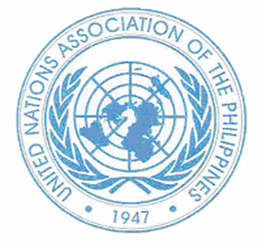 Logo of the United Nations Association of the Philippines | |
| Abbreviation | UNAP |
|---|---|
| Formation | 1947 |
| Type | Non-governmental organization |
| Headquarters | Manila, Philippines |
Region served | |
Official language | Filipino and English |
President Emeritus | Judge Aurora N. Reciña (Ret.)
President October 24, 2021 to October 24, 2023 |
| Affiliations | World Federation of United Nations Associations |
| Website | www |
The United Nations Association of the Philippines (abbreviated as UNAP) is a national civic, non-sectarian and non-partisan organization, established in 1947 to help promote in the Philippines the ideals and objectives of the United Nations. To this end, it strives at all times to promote world understanding, cooperation and peace among nations based on human dignity and universal friendship. UNAP is a member of the World Federation of United Nations Associations, based in New York and Geneva, Switzerland. [1]
Contents
- Purpose
- Notable[citation needed] Members
- The General Carlos P. Romulo (CPR) Awards
- Past Awardees
- References
UNAP undertakes a year-round continuing program of activities responsive to the needs of national development and international cooperation and Helps in the realization of United Nations Sustainable Development Goals in the Philippines and the World, in consultation with the United Nations Information Center (UNIC) for the Philippines and in collaboration with the Department of Foreign Affairs, Commission of Higher Education, the Department of Education.Philippine Commission of Women and other Government and Non Governmental Organizations. The youth arm of the UNAP is the United Nations Youth Association of the Philippines (UNYAP). Formerly known as Youth for United Nations (YFUN).
It provides appropriate information to assist in the dissemination of the workings of the United Nations; designed to enhance inter-cultural understanding within the country as well as international understanding, cooperation and peace through the annual celebration of the United Nations Days and Observances, to attain a peaceful, progressive and developed Philippines.
The first UNAP President was Dr. Mariano V. delos Santos, an academician and socio-civic leader and founder of the University of Manila. Former UNAP Presidents include: Senator Geronima Pecson, Former Education Secretary Narciso Albarracin, Dr. Leticia de Guzman, Philippine Women's University President ( October 1974- October 1999), former Congresswoman and Women Leader/Educator Dr. Minerva Laudico (October 24-July 2006) Former Commission on Human Rights Chairperson Judge Aurora Recina (August 2006 - October 24, 2015) Technological University of the Philippines President Dr. Adora S. Pili (October 24, 2015-~October 24,2017)., Dr. Mona Dumlao-Valisno, former Secretary of the Department of Education (Philippines) (October 24, 2017- January 31, 2020). Dr. Amelia Lourdes "AMELOU" Benitez-Reyes University President and Former Chairperson Philippine Commission on Women (January 31, 2019-April 2021) Dr. Editha V. Pillo President Eulogio Amang Rodriguez Institute of Science and Technology (EARIST), (May 1, 2021-October 23, 2021. UNAP Board of Trustees are leaders coming from different sectors of Philippine Society.
